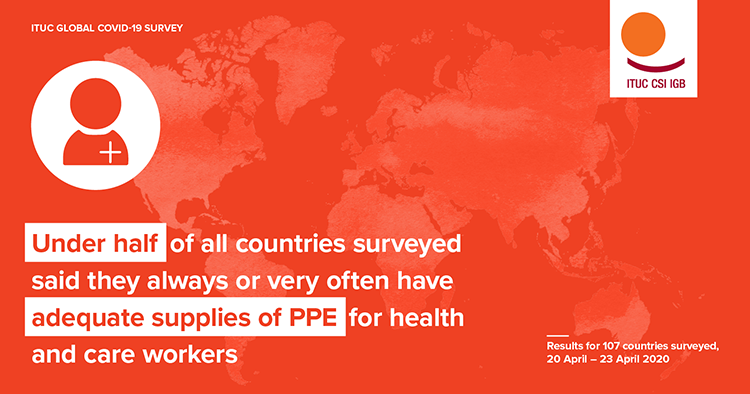The findings in the third ITUC Global Covid-19 Survey of 148 trade unions from 107 countries, including 17 G20 countries and 35 OECD countries carried out between 20th April – 23 April 2020 show the gaps in access to safe workplaces and global concerns on the provision of personal protective equipment for health and care workers.
“Preparing workers to return to work safely in consultation with unions is a critical next step in the response to the Covid-19 pandemic.
Workers need official recognition of Covid-19 as an occupational disease and governments to require reporting and recording of work-related cases, as well as compensation schemes and medical care for victims for work-related Covid-19 and for their bereaved families. Governments in Australia, Denmark, Germany and Malaysia are showing the way – others must follow.
Globally, occupational health and safety must be included by the International Labour Organization as a fundamental right with global standards to protect workers,” said Sharan Burrow, General Secretary, International Trade Union Confederation.
Almost one in five countries (17%) say they are undertaking partial re-opening of workplaces, businesses and community spaces.
Of the 19 countries planning a partial or full re-opening:
- Just five rate the protections in place for workers as good.
- Six rate the protections in place as poor.
- Eight would rate the protections as fair.
In the Americas 44% of countries say measures for safe workplace are poor, and in Africa 41% of countries say workplace safety is poor. Only 25% of countries in Europe rate measures to protect workers from the spread of the virus as good.
While many countries continue to respond to high levels of infections and deaths, shortages of Personal Protective Equipment (PPE) for health and care workers is a serious issue in the majority of countries.
Under half (49%) of countries said that they always or very often have adequate supplies of PPE available for all health workers and care workers responding to the virus. Fifty-one per cent of countries said PPE supplies are sometimes, rarely or never adequate, exposing the risks faced by millions of frontline health and care workers responding to the pandemic.
“Frontline workers including health and care workers are putting their lives on the line to care for Covid-19 patients. The failures to supply enough PPE for workers puts workers, patients and communities at risk and has led to lawsuits by in the US by the New York Nurses Association. On International Workers Memorial Day we remember all those wh have died at work or from work-related diseases and we pledge to fight for the living. Workers must have secure supplies of PPE, and the G20 has a responsibility to ensure trade flows of PPE are not restricted and that prices are stabalised, ” said Sharan Burrow.
The ITUC Global Covid-19 Survey, which includes tracking data from countries which responded in the week of 20th April – 23 April found:
- The majority of countries (61%) are containing the spread of the virus with national lockdown measures including the closure of schools and non-essential businesses.
- Most (54% or 58 countries) believe their government is responding quite well, while just 12% (13 countries) believe their government is responding very well.
- Thirty-four per cent (36 countries) believe that their government is responding badly. This includes 27 (25%) that believe they are responding badly and 9 (8%) that believe they are responding very badly.
- Just over half (51% or 55 countries) believe that employers are responding badly to the needs of workers. Nine countries (or 8%) believe that employers are responding very badly.
“In many countries the struggle will be to keep the meaures governments have put in place for income and wage protection, while in many countries the struggle to achieve guarantees of decent work with jobs, income and social protection has just deepened. Social dialogue between unions, governments and employers is critical. The world cannot go back to business as usual – recovery plans must ensure a socially just future,” said Sharan Burrow.


